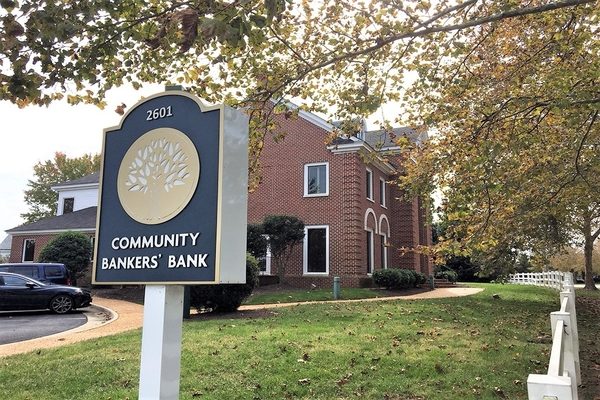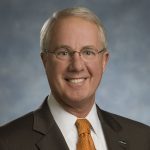Billy Beale didn’t stay away for long.
Less than two years after retiring as CEO of Union Bank & Trust, Beale has stepped back into a chief executive role – this time in an interim capacity at Community Bankers Bank, a struggling Midlothian-based institution.
Beale’s been tasked with righting the ship at CBB, which is one of only about a dozen so-called bankers banks remaining in the country. Such institutions have a niche business model, with smaller community banks as both their customers and shareholders.
“This bank isn’t performing as well as some of the others, and some (CBB) board members that are friends asked me to come help them – and that’s what I intend to do,” Beale said.
His first day on the job was Thursday and he replaces Howard Pisons, who had been with CBB since 2002 and was CEO since 2014. Beale said he’s signed on for an initial six-month period.
Joe Shearin, a member of the CBB board and CEO of Sonabank, said consolidation in the banking industry overall, particularly among community banks, has affected the bankers bank business model.
“The industry is shrinking, so its customer base is shrinking,” Shearin said of CBB. “When community banks merge and get bigger, they might not need a bankers bank as much. There’s a finite amount of customers.”
Steady, substantial profitability has been hard to come by for CBB in recent years.
It turned a profit of $335,000 in 2016, fell to a loss of $361,000 in 2017 and is in the black by $140,000 through the first three quarters of 2018.
This comes during a period of steady profit and growth for most banks, at least in central Virginia.
Its deposit base also has been shrinking. It had $109 million in deposits as of Sept. 30, down from a peak of $142 million in 2013.
Shearin said Beale’s experience growing Union from a small rural bank to among the largest regional banks based in Virginia – it was just shy of $10 billion before he retired in early 2017 and since has surpassed $13 billion – is why the board reached out to try to lure him back into the business, at least temporarily.
“We’ve got to look at a strategy and a global picture,” Shearin said. “That’s where Billy comes in – to help us run it and get the ship right and (determine) what’s our next step.”
Bankers banks act as correspondents to mostly smaller banks, helping connect its customers to go in on loans together that are too large to do on their own, and providing investment services, among other services.
CBB was founded in the mid-1980s as Virginia Bankers Bank, serving smaller banks in a time of expansion of interstate banking. It changed its name in the ’90s when it expanded its territory to Federal Reserve’s fifth district, which covers Virginia, South Carolina, North Carolina, Maryland, West Virginia and Washington, D.C.
Bankers banks are owned by their customer banks. CBB, for example, has Union and Sonabank as shareholders. But illustrating how consolidation has changed CBB, one of its current shareholders is PNC Bank, a massive bank out of the northeast that received CBB shares as a result of acquisitions.
To prepare for the new role, Beale said he resigned from Union’s board of directors to clear up any potential conflicts of interest, as Union is one of the largest shareholders of CBB.
He said his initial plan of action at CBB is to help the bank find ways win more customers and business.
Beale said he was enjoying retirement, as he took three trips to Europe, and spent time with his grandkids and at the river. But he’s also excited about the challenge involved in the CBB gig.
“I would not have come seeking the challenge, but it’s kind of fun,” he said. “It’s fun to take over a bank that’s struggling and see what I can do with it.”
Billy Beale didn’t stay away for long.
Less than two years after retiring as CEO of Union Bank & Trust, Beale has stepped back into a chief executive role – this time in an interim capacity at Community Bankers Bank, a struggling Midlothian-based institution.
Beale’s been tasked with righting the ship at CBB, which is one of only about a dozen so-called bankers banks remaining in the country. Such institutions have a niche business model, with smaller community banks as both their customers and shareholders.
“This bank isn’t performing as well as some of the others, and some (CBB) board members that are friends asked me to come help them – and that’s what I intend to do,” Beale said.
His first day on the job was Thursday and he replaces Howard Pisons, who had been with CBB since 2002 and was CEO since 2014. Beale said he’s signed on for an initial six-month period.
Joe Shearin, a member of the CBB board and CEO of Sonabank, said consolidation in the banking industry overall, particularly among community banks, has affected the bankers bank business model.
“The industry is shrinking, so its customer base is shrinking,” Shearin said of CBB. “When community banks merge and get bigger, they might not need a bankers bank as much. There’s a finite amount of customers.”
Steady, substantial profitability has been hard to come by for CBB in recent years.
It turned a profit of $335,000 in 2016, fell to a loss of $361,000 in 2017 and is in the black by $140,000 through the first three quarters of 2018.
This comes during a period of steady profit and growth for most banks, at least in central Virginia.
Its deposit base also has been shrinking. It had $109 million in deposits as of Sept. 30, down from a peak of $142 million in 2013.
Shearin said Beale’s experience growing Union from a small rural bank to among the largest regional banks based in Virginia – it was just shy of $10 billion before he retired in early 2017 and since has surpassed $13 billion – is why the board reached out to try to lure him back into the business, at least temporarily.
“We’ve got to look at a strategy and a global picture,” Shearin said. “That’s where Billy comes in – to help us run it and get the ship right and (determine) what’s our next step.”
Bankers banks act as correspondents to mostly smaller banks, helping connect its customers to go in on loans together that are too large to do on their own, and providing investment services, among other services.
CBB was founded in the mid-1980s as Virginia Bankers Bank, serving smaller banks in a time of expansion of interstate banking. It changed its name in the ’90s when it expanded its territory to Federal Reserve’s fifth district, which covers Virginia, South Carolina, North Carolina, Maryland, West Virginia and Washington, D.C.
Bankers banks are owned by their customer banks. CBB, for example, has Union and Sonabank as shareholders. But illustrating how consolidation has changed CBB, one of its current shareholders is PNC Bank, a massive bank out of the northeast that received CBB shares as a result of acquisitions.
To prepare for the new role, Beale said he resigned from Union’s board of directors to clear up any potential conflicts of interest, as Union is one of the largest shareholders of CBB.
He said his initial plan of action at CBB is to help the bank find ways win more customers and business.
Beale said he was enjoying retirement, as he took three trips to Europe, and spent time with his grandkids and at the river. But he’s also excited about the challenge involved in the CBB gig.
“I would not have come seeking the challenge, but it’s kind of fun,” he said. “It’s fun to take over a bank that’s struggling and see what I can do with it.”

